Carl E. Olson's Blog, page 124
October 30, 2013
Roe v. Wade: The History and the Truth
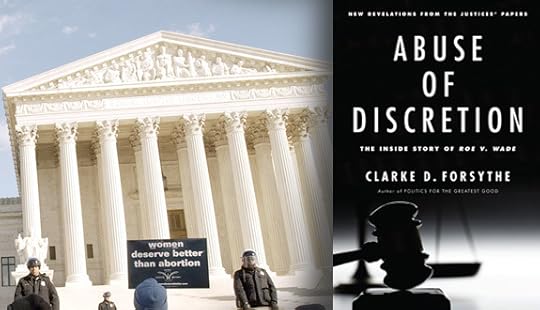
Roe v. Wade: The History and the Truth | Christopher White | Catholic World Report
An interview with Clarke D. Forsythe, author of Abuse of Indiscretion: The Inside Story of Roe v. Wade
Forty
years after Roe
v. Wade, we
are just now learning the back history to the Supreme Court decision
that allowed abortion on demand to become a national policy. In his
insightful and well-researched new book, Abuse
of Indiscretion: The Inside Story of Roe v. Wade (Encounter
Books, 2013), Clarke
D. Forsythe chronicles the complicated history and political details
that led to the most sweeping Supreme Court decision in our history.
Recently, Catholic
World Report, caught
up with Forsythe, Senior
Counsel at Americans United for Life, to discuss the twenty years
of research that went into this important book.
CWR:
The
"right to privacy" established in Griswold
v. Connecticut served
as a precursor for Roe
v. Wade.
Was Griswold the
decision that ultimately paved the way for the justices’
endorsement of legal and unlimited abortion in the United States?
Forsythe:
Not
entirely by itself. The Justices pointed to a number of decisions
that they said created a right to privacy, including the 1972
decision in Eisenstadt
v. Baird—also
heard during the fifteen-week twin vacancies after the retirements of
Justices Black and Harlan in the fall of 1972—which significantly
extended Griswold to strike down regulations on the sale of
contraceptives to single people. The justices largely abandoned the
right to privacy in 1992 in Planned
Parenthood v. Casey
and justified Roe
on the basis of the “reliance interests” of women in abortion as
a back-up to failed contraception—the new glue that holds together
the right to abortion.
CWR:
Most
non-legal scholars overlook the significance of Roe
v. Wade's companion
case, Doe
v. Bolton.
Why do you insist that Doe
is
so important?
Forsythe:
Two
main reasons: First, it is Roe
and Doe
together
which gave us the national policy of abortion for any reason, at any
time of pregnancy. Roe
declared
a right to abortion up to fetal viability; Doe gave us the “health”
exception (defined as “emotional well-being”) after fetal
viability, which is left to the discretion of the provider.
Secondly, Doe
struck down the 1968 Georgia law as too strict, which allowed
abortion in certain circumstances, including the health and safety
regulations in the Georgia laws.
CWR:
Given
the cultural currents of the sixties and seventies—more women in
the workforce, increased sexual license, concerns of overpopulation,
and so forth—weren't the justices that decided Roe
and
Doe
just
confirming public opinion on the matter of abortion?
Continue reading at www.CatholicWorldReport.com.
To Jesus, Through Mary, In the Spirit of St. Joseph: The Wheat, the Rose, and the Lily
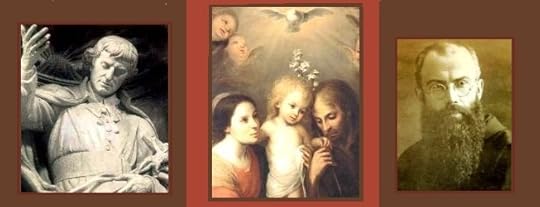
St. Louis de Montfort, the Holy Family, St. Maximilian Kolbe
by Jayson M. Brunelle, M.Ed., C.A.G.S | HPR
St. Louis de Montfort and St. Maximillian Kolbe, … have consistently taught that the most appropriate response on our part to Mary’s role as spiritual mother is filial entrustment, or “total consecration” to her. This perfect devotion of total consecration to Jesus through Mary is truly the most sanctifying of all devotions.
So very few persons, pious Catholic Christians included, realize the
tremendous role of the Blessed Virgin Mary in the sanctification of
souls. Being spiritual mother of the Mystical Body, she, along with the
Holy Spirit, has the tasks of forming Christ in souls, and nourishing
her children with the milk of divine grace. St. Louis de Montfort and
St. Maximillian Kolbe, two of the most outstanding Marian saints, along
with a significant number of other great Marian saints and popes, have
consistently taught that the most appropriate response on our part to
Mary’s role as spiritual mother is filial entrustment, or “total
consecration” to her. This perfect devotion of total consecration to
Jesus through Mary is truly the most sanctifying of all devotions. It is
the purpose of this essay to study the essence of this devotion. We
will begin with an exploration of the image of Mary as the Mediatrix of
all grace, the firm theological foundation for Marian consecration.
Next, we will study St. Louis de Montfort’s explanation of the nature
and motives of the devotion. Finally, we will turn our attention to St.
Joseph’s role in this devotion, focusing first on his spousal union with
Mary as the ultimate model of total consecration; secondly, on his role
as “spiritual father” and protector of the mystical body; and, finally,
on the universality of Joseph as a model of holiness.
Mary, Mediatrix of all Grace
To understand the logic of total consecration to Jesus through Mary,
we must first grasp Mary’s role as Mediatrix of all graces. This is the
Church’s doctrine that every grace that comes to us from God comes
through the willed intercession of Mary. But this role of Mary as
Mediatrix of all grace is really the completion of her role as Spiritual
Mother, and follows from her unique cooperation in the redemption of
humanity with Christ on Calvary. So let us first review these two
concepts of Mary as Spiritual Mother, the Mediatrix of all grace.
We find in Sacred Scripture two primary sources for our understanding of Mary as Spiritual Mother.
Fr. James Schall, SJ, discusses "Reasonable Pleasures"
Matt C. Abbott of Renew American has a short interview with Fr. Schall about the prolific Jesuit's new book, Reasonable Pleasures: The Strange Coherences of Catholicism, published recently by Ignatius Press:
Matt C. Abbott: Father, could you give my readers an overview of your latest book? What inspired you to write it?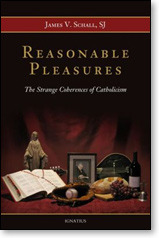
Father Schall: This book was written during a semester that I was
recovering from jaw cancer. I was given a semester sabbatical leave to
recover. I was over the worst in a couple of months, so I had some time
before the Spring Semester (2011) began. I had long wanted to take up
the Aristotelian theme that all human activities have, by nature,
connected with them a proper pleasure.
Obviously, a different kind of pleasure exists for every kind of
activity. We forget that even thinking, or especially thinking, has its
proper pleasure. Aristotle even says, speaking of politicians, that if
they do now know or experience pleasure in the highest things, they will
seek them in lower things. That is really the testimony of human
experience.
The rightness or morality of a pleasure is not itself but the activity
in which it ought to exist. Thus, if we separate the pleasure from the
activity in which it should exist, we distort and abuse both the
activity and the pleasure that belongs to it. Aristotle said that
pleasure is one of the common definitions of happiness. But on
examination, it cannot be its essence. Pleasure follows an activity. If
the act is wrong, the pleasure remains, but it is distorted. If the act
is good, the pleasure is proper and enhances the activity. This is what
is rooted in our being.
The basic theme of the book is that pleasure as such is a good, a
natural good that was intended to be consequent to or implicit in any
act. Yet, it is clear that we have many possibilities to separate
pleasure from its proper act. When we do this, we introduce disorder
into our souls. Our lives should be full of delight and pleasure. But in
a proper order. Putting order into our pleasures is the work of reason.
It often takes understanding followed by discipline or practice. We are
to order our lives. No one else will or can do it for us. Thus a
principal part of education is simply to teach what sort of pleasure
belongs to what act and why.
Our human lives have many levels. What this book strives to do is to
spell out the levels and to point to the pleasures proper to human
living. I do this in part to recall that many heresies or philosophic
disorders want to make pleasure an evil. There can be evil connected
with pleasure, but only when we separate it from its proper act.
Obviously, the title of the book assumes that there are "unreasonable"
pleasures. Actually, the un-reason does not lie in the pleasure itself
but in the activity from which it flows. It is always my position that
to live well, we must think well. This is why this book is really an
exercise in thinking about pleasures in their different modes. We do not
forget that our end is seeing God, eternal life. But this "seeing" this
beatific vision, is also a delight. But we do not "see" God for the
delight of seeing but for God Himself. The delight follows the seeing.
Once we understand this relationship, we can better order our lives to
delight in them.
Read the entire interview at RenewAmerica.com.
Here is more about the book, which is also available in electronic book format:
The fact of pleasure is obvious to us, but its relation to reason is
less understood. We are beings who laugh and run, sing and dance, but
we too seldom reflect on why we do these things. Above all, we are
beings who think and who want to know whether our lives make sense.
In this thought-provoking study of the relationship between our reason
and our experience of pleasure, popular professor and author Fr. James
Schall shows how reason, religion and pleasure are not in conflict with
one another. Religion has to do with how man relates to God. Catholicism
is not so much a religion as a revelation. It records and recalls how
God relates to man.
The popular mood of our time is that neither religion nor revelation has
much to do with real life. Yet when we look at things as having meaning
and order, they fit together in surprising ways. This coherence should
bring us joy, and teach us how reason, religion and pleasure can work
together for our benefit. Schall shows us in this book why we have many
reasons to think that our lives make sense, that our pleasures can be
reasonable, and our reason itself is a pleasure.
James V. Schall, S. J., was a popular and highly
regarded Professor of Political Philosophy for many years at Georgetown
University until his retirement in 2012. His previous books include Another Sort of Learning, Idylls and Rambles, The Life of the Mind, At the Limits of Political Philosophy, and The Order of Things.
Praise for Reasonable Pleasures:
"A timely treatise when the sources of our being, and of our culture,
are challenged on a daily basis. Steeped in classical learning, Schall
shows the value of a Catholic mind filled with the wisdom of the past,
in addressing the relativism and skepticism of the present. Schall is
one of the foremost Catholic intellectuals of our day."
- Jude P. Dougherty, Dean, School of Philosophy, Catholic University of America
"With the inspiration of Plato and other great sages, it is indisputable
that the greatest contemporary guide of What Is is James V. Schall, as
this book so beautifully, cogently, and accessibly demonstrates on every
page."
- Patrick J. Deneen, University of Notre Dame
"This is Schall at his best-learned, witty, and profound. He reminds us
that existence and our deepest selves have an underlying unity that can
be discovered with reason and grace."
- Gerald Russello, Editor, University Bookman
"The book's chapters on hell, eternal life, and dogma are worth the read in themselves."
- Raymond Dennehy, Professor of Philosophy, University of San Francisco
"A bracing antidote to the disorientation of modernism that casts Man as
an intruder in the universe . . . delivered in Fr. Schall's inimitable
style-serious matters wrapped in wit and wisdom."
- Mary Jo Anderson, Author, Male and Female He Made Them
"Schall brilliantly leads his readers to discover the ‘reasonable
pleasures' found in the mind's ability to know truth. The book is
suffused with the joy of learning and, above all, the joy of
contemplation and worship."
- Christopher Cullen, S.J., Fordham University
"Schall points towards real joy in a world going through gloomy times-Christian dogma as the soul of true wit."
- Joseph Wood, Institute of World Politics
October 29, 2013
Liturgical Music Today: The Best of Times, the Worst of Times
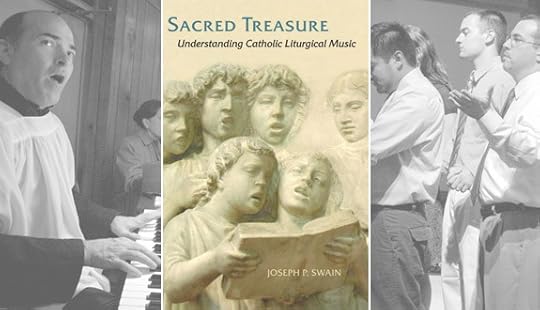
Liturgical Music Today: The Best of Times, the Worst of Times | Carl E. Olson | CWR
Joseph P. Swain, author of Sacred Treasure: Understanding Catholic Liturgical Music, with straight talk about sacred music.
Dr.
Joseph P. Swain
is associate
professor of music at Colgate University and author of several
books about music, including A
Historical Dictionary of Sacred Music (2006),
Harmonic
Rhythm: Analysis and Interpretation (Oxford,
2002), and Musical
Languages (Norton,
1997). He has also written numerous articles for journals including
Music Perception, Journal of Musicology, Music Analysis, Criticus
Musicus, Opera Quarterly, and
Catholic World Report. His
most recent book is Sacred
Treasure: Understanding Catholic Liturgical Music (Liturgical
Press, 2012), which is described as “an
exercise in pragmatic music criticism. … Sacred
Treasure shows
how the hard facts of music must be taken into account in any
holistic conception and any lasting form of liturgical music.” Dr.
Swain was recently interviewed by Carl E. Olson, editor of Catholic
World Report,
about his book and the state of liturgical music, what Vatican II
actually said about sacred music, and what can be done to improve the
music heard in parishes throughout the United States and beyond.
CWR:
Taking up
Dickens' famous opening lines in A
Tale of Two Cities,
you open your book by stating that when it comes to
Roman Catholic liturgical music, it is both the worst of times and
the best of times. What are some examples of each? What is unique
about this particular era as far as liturgical music is concerned?
Dr.
Swain: At no time in history has the Church had to hand, in print
music and recordings, such a wealth of liturgical music of amazing
variety and of the highest quality. At no time have such numbers of
highly trained church musicians been available to sing and play that
music. At no time has there been such a pitch of interest in liturgy
and its music on the part of everyday, churchgoing Catholics. These
are the best of times.
At
the same time, only a tiny fraction of the liturgical music thought
by Catholics and non-Catholics alike to be among the most beautiful
ever conceived is ever heard by everyday Catholics at mass. The fine
professionals who want to contribute their services are often not
allowed to perform it; they put aside their long training and look
for other kinds of work. And the interest in liturgical music has
apparently led only to strife within and between parishes, rather
than healthy traditions of liturgical music, and there appears to be
no end in sight.
Such
paradoxes are what make our times unique in the history of liturgical
music.
CWR:
Sacred Treasure covers a tremendous amount of
material—musical, theological, historical, and cultural—and you
describe it, in the Preface, as "an exercise in pragmatic music
criticism." What was your main goal in writing the book? How
might, respectively, a liturgist, a musician, and an "average"
lay person benefit from reading it?
October 28, 2013
A Diabolical, Nostalgic Plan

A Diabolical, Nostalgic Plan | Michael Coren | Catholic World Report
"Division. We love it, we relish it, we eat and drink it, we splash around in the bath of it."
Dear
Wormwood,
Your
uncle is, as you know, a little—how shall we say?—distracted
right now, and as I am considered something of an expert when it
comes to Christians of the Catholic variety, I’ve been asked to
help out a little.
I’ve
looked at the files on your man, and you need to be extremely careful
here. The believers on what the humans call the “left” of their
church are easy. We’ve managed to convince them that salvation is
to be found in social programs, liberal politics, and making jokes
about conservatives. We’ve done a wonderful job in making it all
about politics for them—all about the good they think they can
do—and the angrier they become at those they see as their earthly
enemies, the further they move away from their god. It’s very
successful, and such great fun too. The joke is that they hardly
change anything anyway, but the better and more pompous they feel
about themselves the less humble and more strident they are, and that
makes our enemy even more upset and disappointed.
Anyway,
more about that and them later. You see, your little man is of the
other variety, the conservatives. They’re much more tricky. They’ve
seen through our propaganda campaign—“everything in the past was
wrong”, “we have to change with the times”, “intelligent
people don’t believe that” and so on. We’ve tried using doubt,
confusion, fear, and the truly delicious “apathy” but it doesn’t
work on them. So, let me suggest another approach. It’s what I like
to call nostalgia. Try to make them confuse Catholicism with history,
and faith with living in the past.
Catholic Education and Studies in Advanced Relativism
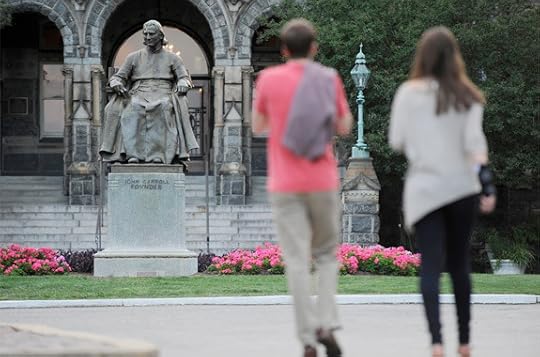
Campus of Georgetown University in Washington. (CNS photo/Jonathan Ernst, Reuters)
Catholic Education and
Studies in Advanced Relativism | Connor Malloy | CWR Blog
“Is the faith tangible," asked Benedict XVI in 2008, "in our universities and schools?” The answer is overwhelmingly negative.
“The
danger of a dictatorship of opinion is growing, and anyone who
doesn't share the prevailing opinion is excluded, so that even good
people no longer dare to stand by (such) nonconformists. Any
future anti-Christian dictatorship would probably be much more subtle
than anything we have known until now. It will appear to be
friendly to religion, but on the condition that its own models of
behavior and thinking not be called into question.” — Joseph
Cardinal Ratzinger, 1996
Visiting a Catholic campus
this past summer, I passed a class meeting outdoors on that sunny
afternoon. A student was presenting to her classmates on the topic of
“leadership.” She was confidently expressing to them how she
exemplified leadership in her life: “When I speak, I make sure I
speak in a way so that people listen. Even if you don’t know what
you’re talking about, just speak like you do know and loud enough
so that people will believe you.” Was this young woman knowingly
spouting examples from Relativism 101? So convincing was she that I
fell for her ruse: I believed everything she said in those few
seconds I was within earshot.
For those involved in
Catholic higher education as students, administrators, faculty and
parents this is a unique academic year, one in which the persuasion
of the Catholic vision is met with increasing blank stares and
uncomprehending minds. What is a Catholic university today? Is the
use of the word “Catholic” a mere marketing tool, a brand to
attract prospective students from certain economic backgrounds?
The Ethics of Water
The Ethics of Water | Christopher Meehan | Homiletic & Pastoral Review
Some 13 percent of the world’s population does not have access to improved water (about 910 million people).
For most Americans, few things are more easily taken for granted than
the water tap. The ability to turn on any tap, anywhere, and receive
clean, clear, potable water is a privilege to which we have grown numb.
As one author states it: “For at the heart of the matter is society’s
disconnection from water’s life-giving qualities. For many of us, water
simply flows from a faucet, and we think little about it beyond this
immediate point of contact. We have lost a sense of respect…” 1
And although the author is alluding to our loss of respect for water, I
would posit that we have also lost our respect for each other when it
comes to water and its fair distribution, for although most of the
developed world has access to clean water, approximately 87 percent,
according to one source, 2;
by contrast, then, some 13 percent of the world’s population, does not
have access to improved water. Applying this percentage to the currently
estimated world population figure of seven billion people means some
910 million people are without safe drinking water. This fact raises
many ethical issues regarding water usage and distribution. Is everyone
entitled to be given water no matter where they live? How much water is
one entitled to use? Answering these kinds of questions requires a water
ethic. This article hopes to raise an issue most of us take for
granted, but one that is important, ethically and globally, and one
which could be preached about and thought about from a more theological
view.
The Fundamental Question
The first question one should ask when formulating a water ethic is:
What is the most important guiding principle? In other words, what
should be the overarching point of reference when making decisions
regarding water policy, water technologies, rights of access, etc.?
October 27, 2013
The Power of the Religious Habit: A True Story

The Power of the Religious Habit: A True Story | John H. Ballentine | HPR
Sister Z herself says that her habit is a daily reminder of her vow to God. Since a religious habit is a sacramental, it is an outward sign disposing the wearer (and others who see it) to receive graces.
Sister Mary Brendon Zajac, S.N.D., hails from a clan based in Ohio. I
suppose that every Sister of Notre Dame deserves her personal
Quasimodo, and for this one, I fit the bill.
Too many people are hesitant to relate to those enrolled in religious
orders. True, nuns should be treated with reverence due to their
special commitment and vows, and yet, like you and me, they are working
out their salvation with fear and trembling. Unlike you and I, though,
most of them are making great strides in sanctity because they usually
keep Jesus Christ foremost in their minds—and rightly so, considering
that eternity is forever, and this present life is short. Most of us are
caught up in the distractions of the day.
We seem to be frightened of the idea of holiness. We get itchy and
fidgety whenever we get close to it, as if suffering from an allergic
reaction. We find it more comfortable to wallow in the muck of our
fallen nature. This fright is silly when we stop to think about it,
because we are invited by God, and to be as holy as he is. That’s why we
call ourselves “Christians.”
I often kid Sister Z by telling her that I won’t put her on a
pedestal, no ma’am. In fact, I’m her personal millstone. I plan on
holding onto her cloak so tightly that I’ll be dragged along when she is
lifted up to heaven. She reminds me that this idea did not work for
Elisha, as he watched Elijah riding into heaven, and assures me that she
will leave me her cloak. She knows that I, being weak and a great
sinner, need at least a double portion.
Like all good brides, Sister Z follows her divine Groom’s
instructions, and so she recently visited this social leper in his
Virginia prison. Jesus descended into hell to preach to the souls there,
after he died on the cross and before he rose from the dead. Sister Z
came to this purgatory on earth to speak with me. At her visit, I had a
chance to see just how powerful her cloak is. In fact, I was graced to
witness one of God’s ordinary little miracles, the kind, you know, that
happen all the time if you just keep your eyes open, or maybe I should
say, if you look with the eyes of faith and keep an open mind.
CDF Clarification on Divorced and Remarried Catholics
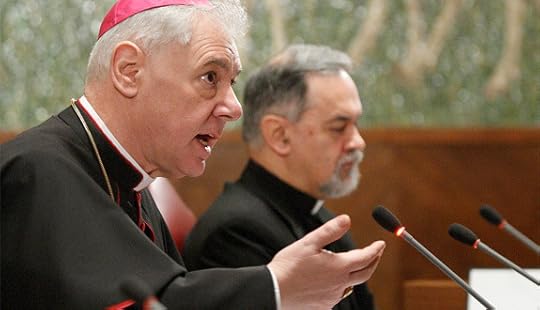
Abp. Gerhard Ludwig Müller, now Prefect of the Congregation for the Doctrine of the Faith, in 2010. (CNS file photo)
CDF Clarification on Divorced and Remarried Catholics | Michael J. Miller | CWR
“God’s mercy does not dispense us from following his commandments or the rules of the Church."
Recent
headlines give the impression that the Catholic Church may soon
change her discipline about divorce and remarriage. Pope Francis, in
his interview with a Jesuit confrere, sympathetically described a
woman who after a failed first marriage has happily remarried and now
has five children. The Pope has called an extraordinary meeting of
the Synod of Bishops in October 2014 to discuss “the pastoral
challenges of the family”. A German diocese drew up its own
guidelines for divorced and remarried Catholics, allowing some of
them to receive Holy Communion under some circumstances.
What
is the average Catholic to think?
To
promote a more in-depth understanding
on “this pressing subject”, so that clergy may instruct the
faithful “in a manner consistent with the truth of Catholic
Doctrine”, L’Osservatore
Romano published
a lengthy article by the Prefect of the Congregation for the
Doctrine of the Faith clarifying the matter. The article, entitled
“The Power of Grace: On the
indissolubility of marriage and the debate concerning the civilly
remarried and the sacraments”, appeared in
the issue dated October 23 (actually published on Tuesday, October
22).
In
the introductory paragraph Abp. Gerhard Ludwig Müller notes that
“the
problem concerning members of the faithful who have entered into a
new civil union after a divorce is not new. The Church has always
taken this question very seriously and with a view to helping the
people who find themselves in this situation.” Given the
increasing numbers of Catholics in this situation in recent decades,
now “even firm believers are seriously wondering: can the Church
not admit the divorced and remarried to the sacraments under certain
conditions? ... Have theologians really explored all the
implications and consequences?”
Of
course this is not a matter of public opinion or evolving social
norms.
October 26, 2013
The Prayers of Pharisees and Tax Collectors
Readings:
• Ex 17:8-13
• Ps 121:1-2, 3-4, 5-6, 7-8
• 2 Tm 3:14-4:2
• Lk 18:1-8
“But when the Son of Man comes, will he find faith on earth?” That direct and challenging question concluded last week’s Gospel reading, the parable of the widow and the unrighteous judge. It is worth repeating here, first, because it is a question for each of us to contemplate on a regular basis and, secondly, because today’s Gospel reading is both an explanation of the question and an exhortation to authentic faith.
Having asked the question, Jesus then told a parable specifically addressed “to those who were convinced of their own righteousness and despised everyone else.” There is, in other words, a false righteousness and a true righteousness. The former is a product of our own making, based in the belief that we can make the rules and then fulfill them perfectly on our own. This usually involves external actions, especially those deeds that draw positive attention to ourselves, for our own sake.
This, of course, is what the Pharisee does in going up to the temple and taking “up his position”, that is, a position of prominence. However, we should be careful to not simply write off the Pharisee as an arrogant hypocrite; we should be mindful that his fasting and tithing required real and substantial effort. In fact, as biblical scholar Joachim Jeremias notes, “To its first hearers the parable must have seemed shocking and inconceivable”, precisely because the Pharisee’s prayer was the sort of prayer a Pharisee—a defender and interpreter of the Law—would be expected to utter. It was the norm, and as such Jesus’ criticism of it was likely startling to many of his listeners.
As is the case in many parables, Jesus purposefully created a strong contrast between two very different groups or individuals. His point was not to say that all Pharisees were alike. The portrayal of the Pharisees in the Gospels is far more nuanced and varied than is often admitted: Nicodemus came to visit Jesus in secret (Jn. 3:1-5) and other Pharisees were clearly interested in learning from Jesus (cf. Lk. 7:36-50; 14:1-6). We are used to hearing of how hypocritical and disingenuous were the Pharisees, but that perception was hardly widespread in first century Judaism.
In a related way, it would have been rather strange to hear of a repentant, humbled tax collector, for tax collectors were widely reviled for being corrupt, greedy, and ruthless men who put allegiance to the Roman empire ahead of any other concern. Yet the tax collector “stood off at a distance” and would not even raise his eyes to heaven, a sign of his clear recognition of sin and unworthiness before God. “You see him abstaining from all boldness to speech,” observed St. Cyril of Alexandria, “He seems devoid of the right to speak and beaten down by the scorn of conscience. … You also see that he accuses his own depravity by his external manner.”
The tax collector’s prayer, it appears, was silent; he knew he was deadly ill with mortal sin and in desperate need of a divine physician. He was, without a doubt, the very thing the Pharisee believed him to be: greedy and dishonest and everything else. But rather than mention, like the Pharisee, what he has done, the tax collector simply begs for mercy while stating directly who and what he is—a sinner. Perhaps he was familiar with the great Psalm of David, which states, “My sacrifice, God, is a broken spirit; God, do not spurn a broken, humbled heart” (Psa. 51:19).
Authentic righteousness and holiness are gifts. “The sinner is justified,” taught St. Thomas Aquinas, “by God moving him to righteousness…” Humility is necessary, for humility is the recognition of who we are in the light of God’s holiness. “Never place yourself above anyone,” warned St. Basil the Great, “not even great sinners. Humility often saves a sinner who has committed many terrible transgressions.” God is the God of all, but he is the Savior of the humble and contrite.
(This "Opening the Word" column originally appeared in the October 24, 2010, edition of Our Sunday Visitor newspaper.)
Carl E. Olson's Blog
- Carl E. Olson's profile
- 20 followers




